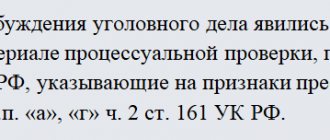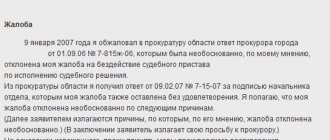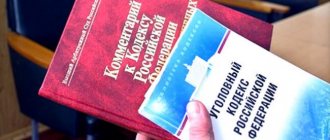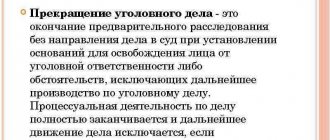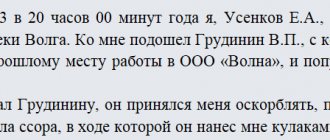When can you appeal a criminal case?
Like any other procedures in criminal proceedings, the initiation of a case must be carried out in strict accordance with the requirements of the law - the Code of Criminal Procedure and other rules. And if at least one element is violated, it becomes possible to appeal the decision to initiate a criminal case and cancel it, thereby avoiding bringing the case to court and possible unpleasant consequences. However, for an effective appeal, one of the following situations must occur:
- there were obstacles to initiating a criminal case - there are a number of restrictions on opening a case, including the expiration of statutes of limitations, amnesty for the accused, insufficient age for criminal liability, etc., which directly prohibit initiating criminal proceedings. If the case is open, the decision can be successfully appealed;
- the established procedure for initiating criminal proceedings was not followed - the entire pre-trial investigation procedure, including the decision to open a case, must be carried out in strict accordance with current legislation. Recorded deviations and violations are grounds for appeal against the initiation of a case;
- lack of corpus delicti or insufficient justification - a criminal case must be initiated on the basis of a proven fact of an offense and evidence obtained legally. If the investigation does not have enough such evidence, the accused can appeal the initiation of the case.
In addition to the above, the basis may be the incompetence of law enforcement officers who opened the case, personal hostility, conflict of interest, etc. - in a word, any circumstances that can be interpreted in favor of the accused. Therefore, the participation of a lawyer before the initiation of a criminal case is very important - he will be able to select a suitable basis for an appeal.
How to write an appeal
The main goal of the complaint is to prove that the decision made by the inquiry officer or investigator was not properly justified, is unmotivated or does not comply with the Code of Criminal Procedure of the Russian Federation.
Based on this, care must be taken to ensure that the claims are spelled out as clearly and competently as possible in the petition and that indisputable evidence for initiating a criminal case is presented.
It is important to adhere to a business style, clearly and consistently refute the arguments specified in the resolution, and also present your arguments, referring to relevant documents, certificates, examinations and other evidence.
Contents of the complaint
An application to appeal a decision to refuse to initiate a criminal case must contain the following blocks:
- the full official name of the organization to which the complaint is being filed;
- information about the applicant (full name, residential address);
- number and date of registration of the resolution and inspection materials;
- an indication of the relevant articles of the procedural code of the Russian Federation;
- comprehensive information about violations committed by investigators;
- indication of the article that is violated by the decision (most often this is Article 45 on the protection of the rights and freedoms of citizens of the Russian Federation and Article 46 on the judicial protection of rights and legitimate interests);
- demands (cancel the decision, reconsider the case, hold an employee of the investigative department accountable for dishonest performance of duties, etc.);
- date of application, signature of the applicant.
Applications demanding the dismissal of an official, as well as containing requests for the provision of special rights or privileges to the applicant, will not be considered.
Example of a complaint
Where to go to appeal a criminal case?
One of the main questions that worries people in such situations is: where to go to appeal the initiation of a criminal case? After all, a complaint to higher authorities does not look very reliable: most likely, management will not want to understand the actions of their subordinates, and the decision will remain in force. According to the Criminal Procedure Code, a person against whom a criminal case has been initiated has two options - extrajudicial and judicial appeal. Let's take a closer look at each of the options.
Is it possible to appeal the initiation of a criminal case without going to court? Yes, of course, there is such an opportunity, but you won’t have to communicate with the investigator or his superiors. To do this, you need to file a complaint with the prosecutor at the place where the case was opened. However, it is also possible to file a complaint with the head of the investigative agency, but the likelihood of its satisfaction is very low. The prosecutor must respond to the complaint within 3 days (in some cases, if additional action is required, up to 10 days), and if the argument is convincing, the decision may be in favor of the accused.
However, in practice, out-of-court appeal is used quite rarely as it is ineffective, and it is better to immediately go to court. It is also possible to go to court after receiving a refusal from the prosecutor or the head of the investigative body. A complaint is filed with the court of general jurisdiction at the place of registration of the accused. The appeal must be considered by the court no later than 5 days after receiving the complaint. The exact time is communicated when filing an application at the court office.
Resolution to refuse to initiate a criminal case based on B.’s application.
Samara May 16, 2016
Investigator of the OD for the Krasnoglinsky district of Samara, Jr. police lieutenant Zemskova A.O. having examined the materials of the criminal case 201514592
INSTALLED:
dd.mm.yyyy at approximately 07.00 hours, an unknown person, being at the “bee” store, located on (hidden), inflicted bodily injuries on B., who was also there, causing her, according to expert opinion No. 04-8m/905 dated 04/22/2015. closed fracture of the 5th metatarsal bone of the right foot without displacement, causing moderate harm to the health of the latter.
According to this fact, dd.mm.yyyy. a criminal case was initiated under Art. 112 part 1 of the Criminal Code of the Russian Federation.
B. was questioned as a victim, who testified that dd.mm.yyyy. at 01.35 she finished her work shift. Since it was Saturday and she had a day off the next day, she, along with her colleagues B.Yu. and K.N. I decided to go to the Breeze cafe to relax. They walked to the Breeze cafe. When they arrived at the cafe, they went into the main hall. At the same time, she saw that there was a group of girls in the summer annex. Among them was D., whom she had previously known. She had not previously communicated with her, but D.’s mother had previously worked with her and there was a conflict between them. D. was aware of this conflict. Together with De. there were two more girls: one of them - I. - was familiar to me as a resident (hidden), she had not previously communicated with her. She didn’t know the second girl at all; later she learned that her name was A.. When she and her friend walked past these girls into the main hall, none of these girls said anything to anyone. She and her friends went into the main hall, they sat down at a free table, ordered hot food and beer. During the evening she drank 1 bottle of beer, she was not intoxicated, she felt normal. Mostly we danced in the cafe. At some point she saw her friend O., she doesn’t know her last name, they work in the same building. At approximately 3.00 o'clock dd.mm.yyyy. a guy about 25 years old approached them; she had seen him several times before at the Breeze cafe, but did not remember his name. When he approached them, he introduced himself as M.. He joined, danced with them, most of the time he talked with B.. At about 4.00 o'clock the cafe closed. She, along with B., M. and O. went out into the street, stood for a while near the cafe, and then walked to the “Kresty” taxi rank on the square of Krasnaya Glinka village. When they arrived at the square, they went to the “24 Hours” store not far from the “Pchelka” store on (hidden), where they bought a bottle of beer. After that, they decided to sit on a bench under the arch in the square. She and O. were sitting on the bench on the left, and B. and M. on the right. Not far from this store there was a dark-colored Lada Priora car, near it there were young people who were drinking beer. Sitting on benches, they saw that people coming from the cafe stopped near the car and talked. After some time, at about 6.00 o’clock, D., A. and I. walked past them towards the alley. None of them said anything to each other. About 5 minutes later they walked back past them, and I. approached M.. She began to take him by the hand, call him with her, pull him, stroke him on the shoulder, saying: “Why are you sitting with these old ladies, it’s more fun with us.” A. and D. stood not far from us and watched I.’s actions. M. became embarrassed and began to refuse. She asked I. to leave and take her friends with her. At the same time, she told her that there was no need to impose herself like that, and that M. would not go anywhere with them. After this, D. unexpectedly began to express complaints to her and tell her not to pester I.. Because of this, a verbal conflict began between her and D. She began to insult me, tell me something about my personal life, after which she remembered the conflict that she had with her mother. Then she said: “Do you want me to take revenge on you for my mother?” I replied: “Try it.” After that, D. took out gray sneakers from her bag, which she changed into. Before that, she was wearing platform sandals. At that moment she (B.) got up from the bench and was about 1.5-2 meters from D. Having changed her shoes, D. came up to me from the front and sharply grabbed me by my hair with her left hand, pulling it towards herself. This caused her (B.) to feel severe physical pain and bowed her head down. In response, she also grabbed D.'s hair with her right hand and began to pull it down. During this, she felt that someone ran around me from the right side, grabbed the hood on my T-shirt and began to pull it down, trying to throw her onto the asphalt. She didn't see who it was. Someone then struck her in the right leg near the knee, causing her leg to buckle and causing her to lose her balance and fall on her back. After that, the person who pulled me by the hood of my T-shirt and hit me in the leg began kicking me in the head. He dealt her at least 4 blows to the back of her head, one blow also hit her right cheekbone closer to the eye. I didn’t see who it was. During this, D. leaned over her and continued to hold her hair. It was on the side of my legs. She (B.) also restrained her, holding her by the hair. At this time, O. tried to lift me from the ground by my hands and unclasp my hands so that she would let go of D.. However, she instinctively clenched her hands, and O. was unable to unclench them. During my beating, I saw that 2-3 young people unfamiliar to her approached D. from behind; I can’t describe them. One of them began to make attempts to pull D. away from her. However, in response to this, D. began to actively swing her legs and strike her on my right leg and on the right side of my body. O. at this time helped her get to her feet. With her help, she managed to rise a little and with the soles of both legs she (B.) stepped on the asphalt. At that moment A. kicked me once in the chest, preventing her from getting up. She experienced physical pain from this blow. D. at this time continued to kick her right leg. In total, she struck her on the leg and body more than five times. During this, she also stepped on her right foot with force at least twice, causing her to feel severe dull pain and discomfort. Then the young man managed to pull D. away from her. A. and I. also stepped aside. After that, O. helped her get to her feet, after which they headed towards the 1st block. O. accompanied her. While moving, she felt pain in her right leg in the foot area. D. and her friends continued to pursue her. They walked behind her and O. and said something to me. We reached the Sanitary Materials module 200 meters from the conflict site, several cars were parked there. She asked the driver of one of the cars to take her home. He agreed, and she went home alone. O. went home on foot.
When she came home, she took off her shoes and saw that her right leg began to swell in the foot area, and there was dried blood on it. She called a taxi and went to the emergency room of City Hospital No. 7 in Samara, where they examined her and took x-rays of her leg. She was diagnosed with a closed fracture of the 5th metatarsal bone of the right foot. A plaster cast was applied, after which she went home. After some time, a police officer came to see her and questioned me about the circumstances of my injuries. She filed a statement about this fact with the police.
B. was questioned as a witness, who testified that dd.mm.yyyy. at 01.35 she finished her work shift, after which, together with her colleagues B. and Krotova Nina, she decided to go to the Breeze cafe to relax. They walked to the Breeze cafe on Zhiguli Street, Krasnaya Glinka village, Samara, where they stayed until approximately 04:00 on 08/09/2014. In the cafe they sat in the main hall at one table, ordered hot food and beer. During the evening she drank 1-2 bottles of beer. Natalya drank 1 bottle of beer. They were not intoxicated and felt normal. Mostly they danced in the cafe. At approximately 3:00 o'clock on 08/09/2014. A guy about 25 years old approached us; I saw him for the first time. When he approached us, he introduced himself as M. He joined us, danced with us, and I talked to him most of the time. Also in the cafe B. met her friend named O., she doesn’t know her last name, with whom she talked a lot and danced.
At approximately 4:00 on August 9, 2014, the cafe closed. She, along with B., M. and O. went out into the street, after which they walked to the “Kresty” taxi rank on the square of Krasnaya Glinka village. Then, in the second quarter of Krasnaya Glinka village, they walked to a small arch next to the taxi rank, where they sat on a bench. On the bench on the left were B. and O., and on the right were she and M., they were approximately 1-2 meters apart. After some time, she saw that three young girls of about 20 approached the arch, previously unfamiliar to her, she saw them for the first time, she could not describe them, she did not know their names. The girls turned to M. and started talking to him about something. She doesn't remember what they talked about. She herself did not interfere in the conversation and sat silently. Then a verbal conflict arose between B. and these girls. What caused it, she cannot say. However, during the conflict, she realized that B. and these girls knew each other. Then Natalya and O. got up from the bench, a fight began between the girls and B. Natalya, they pushed each other. During this, they moved a little away from the bench on which she and M. were sitting, as a result of which they disappeared from my field of vision. She did not see what happened between them in the future. She never saw B., O. and the three girls mentioned above. About 20 minutes later she left for home, the time was approximately 06.00 hours. After some time, I learned that during the conflict with the girls, Natalya B. suffered a broken leg. At what moment this happened, she cannot say; in front of her, Natalya did not fall during the conflict, she did not see any of the three girls hitting her, in front of me they only pushed each other. She has nothing more to add to the given fact.
A. was questioned as a witness, who testified that they were sober and did not drink alcohol. Before that, they were in the Breeze cafe on Zhiguli Street, Krasnaya Glinka village, they were there for a short time, after which they went to the square. He and his friends were just talking. At some point, one of them wanted to go to the toilet, after which they headed towards the arch located next to the taxi rank, through which they went inside the block. At the same time, she saw that three women and a young man named M. were sitting on a bench in this arch, who I knew a little, but I don’t know his last name, phone number and residential address. When they walked back through the arch, I. turned to M. and invited him to go with them. M. refused. The woman who was sitting next to M. on the bench said something to I.. She doesn’t know this woman, she can’t describe her. There was a verbal conflict between her and I. Then a verbal conflict also arose between Anna Dmitrieva and another woman, as she later learned - B., who began to insult D. and her mother. She doesn’t remember what exactly they said to each other. I didn’t like that B. spoke badly about Dmitrieva’s mother, so she reprimanded her and asked her to stop expressing insults. At the same time, she addressed B. calmly, did not be rude to her or insult her. While she was talking with B., she noticed that M. and the woman who was sitting on the bench next to him had left in a direction unknown to me. B. did not react to my remark and continued to express insults. Because of this, a verbal conflict began to occur between us in a raised voice. During this, B. got up from the bench and came close to me. Then I., who was next to me, called out to her, and B. also came close to her. I. to this asked Natalya to move away a little, but the latter did not respond to her request, and I. pushed her away from her with her hands to her chest. Since B. Natalya was highly intoxicated, she could not stand on her feet from the jolt and fell onto the asphalt on her side. At the same time, neither I nor my friends approached her and did not inflict any blows on her. Dmitrieva Anna was also next to her. Then B. got to her feet, walked up to her and grabbed my hair with her hands, after which she began to pull it with force, causing me physical pain. She also grabbed B.'s hair with her hand and began to pull it, and with the other hand she held her hair. They didn't hit each other, they just pulled each other's hair. During this, she and B. fell on the asphalt and were in a sitting position with her. Some of those present tried to separate us. At some point, the third woman, who was sitting on the bench with B. before the conflict, was able to pull her away from her, and then took her aside. The conflict lasted from 5 to 10 minutes. She does not remember whether B. struck during the conflict. Perhaps she could hit her in the chest with her hand or foot in order to free herself from her grip. After B. was taken away, he and his friends went home. She did not see whether her friends I. or D. struck B.. Due to the fact that a lot of time has passed since these events, he doesn’t remember what happened well. I. was questioned as a witness, who testified that they were sober and did not drink alcohol. Before that, they were in the Breeze cafe on Zhiguli Street, Krasnaya Glinka village, but they were there for a short time, after which they went to the square. He and his friends were simply talking, standing near a bread store on the square (“crosses”). At some point, one of them wanted to go to the toilet, after which they headed towards the arch located next to the taxi rank, through which they went inside the block. At the same time, she saw that three women and a young man named M. were sitting in the shop in this arch, who she knew a little, but she did not know his last name, telephone number and residential address. As they walked back through the arch, she turned to M. and invited her to go with them. M. refused. After that, she asked him if he was having fun. The woman who was sitting next to M. on the bench said something to her. She doesn’t know this woman, she can’t describe her. There was a verbal conflict between them, which quickly ended. Then the second woman, now known to be B., told us to leave and began making insults about D. and her mother. A verbal conflict ensued between them. She doesn’t remember what exactly they said to each other. However, during this conflict, she realized that B. and D. had known each other before. A. made a remark to B. and asked her to stop expressing insults. At the same time, A.B. was not rude or insulting. She saw that M. and the woman who was sitting on the bench next to him at that time left in a direction unknown to her. B.N. did not react to A.’s remark and continued to express insults. Because of this, B. and A. started shouting at each other. During this, B. got up from the bench and came close to her. Then she turned in her direction. She stood next to A.B. asked what she needed. She reprimanded her about her behavior, insults and asked her to move away, as she came close to her. However, she did not react, and she pushed her away from her with her hands on her chest. Since B. was highly intoxicated, she could not stand on her feet due to the push and fell onto the asphalt on her side. At the same time, neither she nor her friends approached her and did not inflict any blows on her. Dmitrieva Anna was also next to us. Then B. got to her feet, walked up to A. and grabbed her hair with her hands. A. also grabbed her by the hair. At the same time, they fell on the asphalt and were in a sitting position. She, D. and the third woman, who was sitting with B. on the bench, tried to unclasp the hands of A. and B. so that they would let go of each other. At the same time, she did not strike B. or step on her feet. She also did not see Anna Dmitrieva inflict any blows on B.. At some point, B.’s acquaintance was able to pull her away from A., after which she took her aside. The conflict lasted from 5 to 10 minutes. After that, my friends and I went home. Due to the fact that a lot of time has passed since these events, she doesn’t remember what happened well, and there is nothing more to explain to her about this fact.
F. was questioned as a witness, who testified that on 08/09/2014. at night, I don’t remember the exact time, she and her friends A. and I. were in the Breeze cafe in Krasnaya Glinka village. They sat at a table in the summer veranda, talked, did not drink alcohol, since she had to go to work in the morning. During this, she saw that residents of B. walked into the main hall of the cafe along with two friends. We didn’t communicate with them in the cafe. She knows B. as a resident of Krasnaya Glinka. She knows that she previously worked with my mother and they had some kind of conflict. Because of this conflict, B. developed hostile relations with her relatives and horses. When meeting, she often demonstrated this: she could push her with her shoulder when passing by, insult, etc., and provoked conflicts. She didn’t pay attention to her provocations, since she didn’t care about her behavior. She was in the cafe with her friends for a long time, after which they left and headed towards the square on the 2nd block of Krasnaya Glinka village (crosses). There they were near a bread store not far from the taxi stand. They also did not drink alcohol. At approximately 07.00 hours on 09.08.2014. one of us wanted to go to the toilet, after which they headed towards the arch located next to the taxi rank, through which they went inside the block. At the same time, she saw that B., her friends O., Yu. and a young man named M. were sitting at the bench in this arch. At that time, she did not know O. and Yu., their names became known to me later. She only knew M., since he lives in the same building as my mother at the address: (hidden). When they walked back through the arch, I. turned to M. and invited him to come with us. M. refused. After this, I. began to persuade him and said something in relation to the women with whom he was with. She doesn't remember what exactly she said. After this, B. began to insult her and also speak badly about her mother and sister. Because of this, a verbal conflict occurred between them. During this, B. was sitting on a bench, and she was standing about 3-4 meters away from her. The verbal conflict between them took place in a raised voice. A. stood up for me and made B. a remark, asking me to stop insulting her and her relatives. At the same time, A. was not rude or insulting. A. was located approximately 1 meter from the bench on which B was sitting. During this, M. and Yu., who was sitting on the bench next to him, got up and left in a direction unknown to me. After A.’s remark, B. stood up, walked up to her and grabbed her by the hair with her hands. A. also grabbed her by the hair. They began to pull each other by the hair, during which they backed away, could not stay on their feet and fell to the ground, in a sitting position. At the same time, they continued to pull each other's hair. She, as well as several men who were in the square at that time, tried to unclasp the hands of A. and B. so that they would let go of each other. B. held A. tightly by the hair and refused to release her hands. She had to hit B. on the hands several times (2-3 times) so that she would unclench them. The men also tried to unclasp the girls' hands. She cannot tell the details of these men, who it was, she doesn’t know for sure, but they are all residents of the village of Krasnaya Glinka. Since Natalya did not remove her hands from A.’s hair, she also had to hit her on the back twice, but she did not react. Friend B. - O. did not interfere in this conflict. She did not kick B. during this conflict, she did not step on her feet, perhaps by accident when trying to separate the girls, she could have touched B. with her foot, but she does not remember this, she did not intentionally step on B.’s feet, since at that moment she was wearing high platform shoes and could have fallen because of this. At some point, the girls let each other's hair go and went their separate ways. However, then there was a verbal conflict between B. and I.. No one else struck each other. O. began to take B. home, but the latter continued to shout insults, she was highly intoxicated, and did not want to calm down. She stepped aside with A. and after a short time saw that I. approached B.. They shouted at each other, some kind of conflict occurred between them, during which they fell on the asphalt. She cannot say what exactly happened there, since they were far away from them and did not observe them. After some time they went home. During the conflict, she only struck 2-3 punches on B.’s hands and hit her twice on the back. She did not inflict any more blows on her; she did not intentionally step on B.’s feet. She doesn't remember stepping on her feet at all. Due to the fact that a lot of time has passed since these events, she remembers what happened poorly and cannot explain anything more about this fact.
According to the confrontation dated January 18, 2016. between B. and F., F. explained that she delivered 3-4 blows to the area of both hands of B., as well as at least 4 blows to the area of B’s back with the fist of her right hand. Thus, signs of a crime are seen in F.’s actions provided for in Part 1 of Article 116 of the Criminal Code of the Russian Federation.
Considering that this category of cases belongs to the category of private prosecution cases and the jurisdiction of the Magistrates' Court, they are initiated only at the request of the victim. In initiating a criminal case against Fokeeva A.S. according to Art. 116 part 1 of the Criminal Code of the Russian Federation to refuse on the basis of Article 24 part 1 clause 5 of the Code of Criminal Procedure of the Russian Federation. B. is recommended to apply to the Magistrate’s Court of the Krasnoglinsky District of Samara privately.
Also according to the confrontation dated January 25, 2016. between B. and A.E.V., A.E.V. explained that I. pushed B. in the shoulder and side, to which B. fell on the asphalt. Thus, I.’s actions contain signs of a crime under Part 1 of Article 116 of the Criminal Code of the Russian Federation.
Considering that this category of cases belongs to the category of private prosecution cases and the jurisdiction of the Magistrates' Court, they are initiated only at the request of the victim. The initiation of a criminal case against I. under Article 116, Part 1 of the Criminal Procedure Code of the Russian Federation is refused on the basis of Article 24, Part 1, Clause 5 of the Criminal Procedure Code of the Russian Federation. B. is recommended to apply to the Magistrate’s Court of the Krasnoglinsky District of Samara privately.
According to the Criminal Code of the Russian Federation, battery means repeated blows to the body of the victim, beating him (three times or more).
Based on the above and guided by paragraph 2 of the first part of Article 24,
Art. 144,145 and 148 Code of Criminal Procedure of the Russian Federation,
P O S T A N O V I L :
Refuse to initiate a criminal case under Art. 116 part 1 of the Criminal Code of the Russian Federation on the commission of a crime provided for in clause 5 part 1 of article 24 of the Code of Criminal Procedure of the Russian Federation.
Copies of this resolution should be sent to the deputy. Prosecutor of the Krasnoglinsky District of Samara to the Counselor of Justice Frolovsky O.I. and applicant B., explaining to the latter that this decision can be appealed to the prosecutor or to court in the manner established by Articles 124 and 125 of the Code of Criminal Procedure of the Russian Federation.
Interrogator
Copies of the resolution were sent to the deputy prosecutor of the Krasnoglinsky district
City of Samara, Counselor of Justice O.I. Frolovsky
May 16, 2016 at 12:30 p.m.
Interrogator
Hereinafter, in order to maintain attorney-client privilege, the names and surnames of the participants in the case have been changed.
You can view another practice of lawyer Anatoly Antonov in the public domain here
Most common reasons for refusal
Code of Criminal Procedure of the Russian Federation, namely Art. 24 clearly defines the circumstances when a criminal case is not initiated in response to a citizen’s action.
- In the absence of a crime event, that is, the criminal act itself was not committed. An example of such a circumstance would be evidence that the cause of death of the victim was not murder, but suicide.
- If there is no corpus delicti in the action, this formulation is issued if a crime has been committed, but there is no corpus delicti in the actions of the suspect. This is possible when, under the given circumstances, the person’s actions were lawful (necessary self-defense), in the absence of mandatory elements that are part of the crime (murder in the absence of intent, that is, through negligence). Also, a decision to refuse to initiate a criminal case is made if the act does not pose a public danger (Article 14, Part 2 of the Criminal Code). The same decision is made in the case of voluntary refusal to complete the crime (Article 31 of the Criminal Code), commission of a crime in a state of insanity (Article 21 of the Criminal Code), if the age of the person who committed the unlawful act is lower than the age at which criminal liability arises (in In the Russian Federation it is 16, but for especially serious crimes it can be reduced to 14 years) (Articles 20, 30 of the Criminal Code).
Drawing up a complaint
After the inspection materials have been carefully studied, you can begin to draw up a complaint. It is better if a legally competent person who knows criminal law does this. In this case, an appeal against the decision to refuse to initiate criminal proceedings will have a greater chance of success. The complaint must be short and clear. When working on its text, you should not make it emotional; what looks good in regular correspondence is not always appropriate in an official document. The text of the complaint should be short. Another important quality of this document should be the validity and motivation of the complaint.
Applicant's liability
When contacting law enforcement authorities with a statement about accusing a specific person or group of people of a crime, you should remember that this is a fairly serious action. If the inspection did not find confirmation of the indicated facts and, based on its results, a decision was made to refuse to initiate a criminal case, a sample of the collected materials can be transferred for consideration of the issue of initiating a counter criminal case, where a charge of knowingly false denunciation will be brought.
Result
A response to an appeal to the police department and the prosecutor's office must come within a month, while the law allows 5 days for the consideration of a statement of claim filed with a district court.
Cancellation of a previously made decision does not automatically entail the initiation of a criminal case!
If higher authorities consider it necessary to satisfy the demands put forward in the complaint, the application, for which the initiation of a criminal case was previously refused, will be sent for re-examination. Employees of the investigative department will be required to conduct an inspection again, taking into account all the facts stated in the complaint. In some cases, such a mechanism makes it possible to initiate a criminal case. But a repeated refusal cannot be appealed.
Corpus delicti
In order for a criminal case to be opened based on a statement, it is first necessary to prove that a certain set of events took place, known in the Criminal Code as the elements of a crime. It includes characteristics of both the action that occurred and the person who performed this action. According to all the canons of criminal law, this concept includes four mandatory components.
- The object of the crime is what the criminal is attempting to destroy (in case of theft, this is property, in case of murder, life, in case of violence, sexual integrity).
- The objective side is the presence of an unlawful act, that is, the commission of a specific action (or inaction) that poses a social danger and is prohibited by the Criminal Code (directly theft, murder, violence).
- The subject is a capable citizen who has reached the age that allows him to bear criminal responsibility.
- The subjective side is the criminal’s awareness of the illegality of his actions or the ability to foresee that his actions may have dangerous and illegal consequences.
It should be noted that if at least one of the above four points is missing, there is no corpus delicti, then the investigator or inquiry officer has the right to issue a Resolution refusing to initiate a criminal case. An example of such a situation is very easy to find. In relation to a minor, such a decision will be made until he reaches 16 (in special cases - 14) years.

